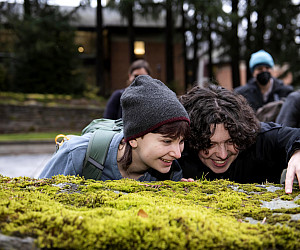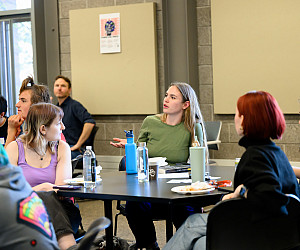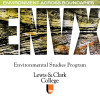Opportunities at LC Lead to Career in Energy Industry

Hello, my name is Kori Groenveld and I am a 2018 ENVS Graduate. I recently started working as a Program Administrator at the Massachusetts Clean Energy Center in downtown Boston, where I work with clean tech innovation and startup investment. I love this work because it accelerates the development of a clean energy economy in the state and the US more broadly. Majoring in ENVS was key to me ending up in this role, largely because ENVS enabled me to shape my LC experience (in and out of the classroom) around my future career.
The energy industry, while one of the most important sectors in terms of mitigating climate change, is hard to break into. There are very few undergraduate programs in the US that prepare students for the energy industry, as it is complex and requires expertise in economics, physics, chemical engineering, and policy. There are several key elements of ENVS and LC more broadly that helped prepare me for this industry.
First, I was able to shape my academic curriculum around renewable energy issues. My sophomore year, I chose to focus my concentration on the relationship between renewable energy and economic development. From here, I was able to select coursework that would form a vital knowledge base, which included classes in law & policy, environmental chemistry, economics, and international political economy. I was also able to write my thesis on renewable energy, which allowed me to further develop expertise.
There were also a host of opportunities available outside of the classroom. During my sophomore year, my teammate and I co-wrote a Renewable Energy Fee Fund Grant (highly recommend ENVS students look into taking advantage of this) to co-fund a solar array on an affordable housing complex in downtown Portland. In addition to creating project development experience for ourselves, we were able to spin the project into a lasting partnership between the affordable housing agency and LC, eventually creating multiple paid internships for students. Winterim, a week-long entrepreneurship experience, was also an incredibly formative experience in building my expertise in creative problem solving and boosting my confidence in public speaking. As I help judge pitch competitions and work on company development in my current role, I think about lessons I learned in Winterim almost daily.
LC’s wide range of opportunities are rare in undergraduate education. I now manage interns who are older than me, likely because many energy industry professionals are only able to gain expertise in the industry after their undergraduate education. Environmental Studies, in helping me shape my passion for renewable energy and related career interests early on, helped me maximize the value of LC’s resources and achieve my career goals from the get go. To anyone interested in a career in energy markets, cleantech innovation, or environmental economics, I strongly recommend planning your LC experience with your career interests in mind.
Environmental Studies is located in room 104 of Albany Quadrangle on the Undergraduate Campus.
MSC: 62
email envs@lclark.edu
voice 503-768-7790
Symposium Advisor Jim Proctor
Environmental Studies
Lewis & Clark
615 S. Palatine Hill Road
Portland OR 97219
More Stories

Environmental Dialogue
Planting the Seeds of Common Ground
This year’s ENVX Symposium, Common Ground: How We Can Engage Across Difference With a Shared Love of Land, was held September 29 through October 3. The symposium united panelists and students in dialogue founded upon months of community conversation and outreach.

“Green” Leader
Lewis & Clark Named One of Nation’s Top Green Colleges
Lewis & Clark ranks No. 26 on Princeton Review’s 2026 list of Top 50 Green Colleges, earning national recognition for its strong culture of environmental responsibility and sustainability. The honor appears in the newly released Princeton Review Guide to Green Colleges: 2026 Edition, which profiles 388 institutions that demonstrate an exceptional commitment to environmental stewardship.

Eco Exchange
Where Environment Meets Community
In this spring’s Environmental Engagement course, students connect classroom learning with real-world conversations, partnering with local nonprofits to address polarizing issues and build mutual trust.

Farming, Oceanography, and the Arctic
Rylie Neely ’20 shares how she continued to use her ENVS education during an unplanned career pause due to Covid.

